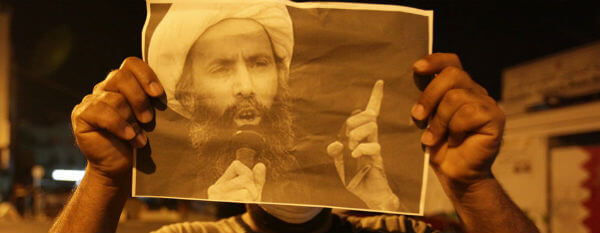
The Washington Post reports: Had Saudi Arabia not sentenced Sheik Nimr Baqr al-Nimr to death, it is unlikely his name would have resonated much beyond the Shiite communities of Saudi Arabia and Bahrain, where he helped inspire anti-government protests by disgruntled Shiites in 2011.
As it was, he became synonymous among Shiites across the region with the oppression of Shiite minorities in the Sunni Arab Gulf, and his execution on Saturday put him at the heart of the most dangerous rupture between Saudi Arabia and Iran in decades.
Forgotten in the furor over the trashing of the Saudi Embassy in Tehran and the subsequent rupture of diplomatic relations by Riyadh is Nimr himself, an enigmatic figure onto whom both sides in the regional conflict have projected their dueling visions.
“He would not have reached this level of prominence if the Saudis hadn’t turned him into a martyr by executing him,” said Mohamad Bazzi, a professor at New York University who is writing a book about the Saudi-Iranian rivalry.
Exactly who Nimr was and what he stood for remain something of a mystery, Bazzi said.
To the Saudis, he was as much of a terrorist as any of the al-Qaeda operatives executed the same day, a traitor who had incited violence and called repeatedly for the overthrow of the Saudi royal family.
His execution was every bit as justified as the killing by U.S. Navy SEALs of Osama bin Laden, a Saudi citizen, said Abdullah al-Shammari, a Saudi political analyst. “Osama bin Laden didn’t kill Americans with his own hand, but his role was to incite people to commit terrorism,” he said.
Iran has cast Nimr as a martyr who died for his faith at the hands of a tyrannical and illegitimate Sunni regime, an heir to the legacy of a long line of martyrs to the Shiite cause.
To his followers, he was an inspiration, a man who articulated their demands for a fairer society and in some instances marched alongside them in their protests. He insulted the royal family in language few Saudis would dare to use, saying in one sermon that he hoped that a Saudi prince who had recently died “will be eaten by worms and suffer the torment of hell in his grave.”
In his own words, according to the available records of his sermons and the few interviews he gave, he was an ardent and uncompromising advocate of the rights of the downtrodden, wherever they might be. Defying the sectarian straitjacket into which he has been cast by the uproar that followed his death, he identified Iran’s ally, Syrian President Bashar al-Assad, as being among the tyrants worthy of being overthrown. He favored peaceful protests — “the roar of the word against authorities rather than weapons,” according to an interview he gave to the BBC in 2011 — but did not explicitly rule out violence as a means of defeating tyranny.
He also defined Shiites as intrinsically more peaceful than Sunnis, telling U.S. diplomats in Riyadh that Shiites, “even more than Sunnis, are natural allies for America,” according to a 2008 diplomatic cable from the WikiLeaks website. [Continue reading…]

